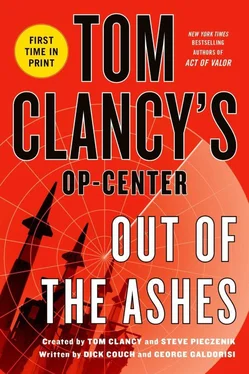The president did recall the man, if a bit vaguely, from his time in the Senate. A four-star Navy admiral leading first the United States Pacific Command, and subsequently the United States Central Command, could never operate completely below the radar of a U.S. senator, even one who was not focused directly on foreign policy or defense matters.
“I do recall the admiral had impressive credentials and was always well thought of. I seem to remember his name being mentioned as a candidate for chairman of the Joint Chiefs of Staff,” Midkiff offered.
“He was,” Hood replied, “but your predecessor chose someone else.”
“Was that all there was to it?” the president asked.
“There was an issue when he was Central Command commander,” Trevor Harward added.
“Mr. Harward has it right, Mr. President,” Hood replied. “There was an incident, one not well publicized, where he was ordered to conduct a strike on a small city in Afghanistan because al Qaeda operatives were thought to have seized control of the city. He told the president and his secretary of defense the strike would cause massive civilian casualties but was ordered to do the strike anyway. He refused.”
“Bet that went over well with my predecessor,” the president said.
“I’ve never asked him to tell me the full story, Mr. President, but from what I hear the president finally recognized the wisdom of what the admiral recommended and never found cause to relieve him of his duties. Still, his secretary of defense never got over it and did everything he could to sandbag the admiral’s candidacy for the chairmanship. He was eased out of his tour as Central Command commander five months early and retired as one of the most accomplished, and honored, flag or general officers I’ve known in my lifetime.” Hood paused before continuing. “I trust him, Mr. President. Along with his leadership and managerial qualities, he’s a man of immense integrity. I think that’s an important attribute for the man to whom you will be delegating this much power.”
“That’s a strong endorsement, Paul,” the president replied, “and a sobering one. But tell me this. What qualities do you think he has that make him the right fit for Op-Center?”
“Mr. President, he puts service above self, will do what is right for the nation, and will never lie to power. I will submit to you, sir, this relationship between you and your new Op-Center director has to be built on trust. He may often have to move quickly, do what he feels needs to be done, and inform you or Mr. Harward after the fact. For this to work, you will have to trust him.”
* * *
Chase Williams waited at the secretary’s desk, anticipating the doors to the Oval Office would open at any moment. He had surrendered his cell phone at the entry of the West Wing and held only a thin Bosca black leather portfolio.
“Admiral, the president will see you now,” the president’s secretary said. “You can go right in.”
Williams opened the door to the Oval Office and strode toward the president’s desk. Wyatt Midkiff was already out in front of his desk to greet him.
Midkiff immediately sized Williams up as a man who didn’t appear intimidated walking into the Oval Office. The six-foot-tall, 170-pound Williams was attired in a Brooks Brothers blue suit and a red and white club tie. Fashionable, but not trendy, Midkiff found himself thinking, and noted Williams didn’t carry himself in the rigid way some former military officers did.
The president prided himself on his ability to size people up quickly and accurately. Confident, self-assured, but not full of himself was his initial assessment.
“Admiral, welcome,” Midkiff began. “I know you know Paul, but I don’t believe you’ve met my national security advisor, Trevor Harward.”
“A pleasure, Mr. Harward.”
“Likewise, Admiral.”
“Well, let’s get to it, shall we?” the president said as he gestured for the three men to sit in the conversational area in the center of the Oval Office. “Admiral, candidly, I have to tell you this is quite a surprise. Other than a brief biographical sketch Mr. Hood provided us, we don’t know a lot about you. Can we assume you’re here because you might be interested in the job as Op-Center director?”
“A job,” Williams said reflectively. “I think we all agree that what we’re talking about is something more than a job. If there is a way I can continue to serve my country, then I’d like to learn more. I have Paul’s perspective on this. Now I’m here to listen to what you have in mind.”
Midkiff considered this. The man had said it without flourish or smugness; it was an honest statement of his position. “Yes, well, Admiral, as you probably know, our analysis of recent events has convinced me we have a missing piece in our national security apparatus. We believe we need to reconstitute something like Op-Center that Paul here used to run.”
“Yes, Mr. President,” Williams replied neutrally.
“Paul has told me he’s not the right person to lead this new entity, but he recommends we consider you for the, ah, the position. Are we all on the same page thus far?”
“I believe we are, Mr. President.”
“Good. As you know, I was a bit surprised when Paul declined the job and then had you waiting, ready to meet with me. What are your thoughts about how we should proceed?”
“To begin with, Mr. President, I think you should tell me what your expectations are,” Williams replied. “In the military, we always begin with a clear understanding of the commander’s intent, and I should like to know what that is.”
Wyatt Midkiff had been a politician for more than three decades. Almost without conscious thought, he continued to size up Williams. Outwardly, the admiral was disarmingly average and would not stand out in a group of senior executives or government officials. Yet it was impossible to miss the man’s focus and strength. Above all else, the president was immediately taken by his quiet intensity and especially his ability to listen . To his surprise and chagrin, Midkiff felt Williams could almost anticipate what he was thinking — his concerns, his apprehensions, and even his reservations. By any measure, Midkiff sensed, this was a formidable individual, one not to be underestimated, and certainly not one to be misled or toyed with.
“Yes, all right then,” Midkiff replied. “I think we agree our current organizations are unable to anticipate and, more importantly, prevent attacks like the ones that occurred earlier this month. And Trevor here and his staff have suggested we reconstitute something like Op-Center to work in those areas where our current organizations can’t often go or can’t be effective. Trevor, do you want to jump in?”
“Thank you, Mr. President,” Harward replied. Turning to Williams, the national security advisor was now equally direct. “Admiral, Mr. Hood and I thought it best if at some point we left you and the president alone to have this important conversation one-on-one, but first, I wanted to weigh in as national security advisor.”
“Yes, Mr. Harward, I’m listening.”
“We’re all familiar with Op-Center’s enviable record under Paul’s guidance. Yet all institutions have their successes and failures. I think we’d all be naive to think the organizations involved didn’t sometimes get into turf wars. Those turf wars did arise between the intelligence community, Defense, and the old Op-Center. Would you agree with me on that, Paul?”
Hood’s antennae were up; he didn’t know where Harward was going with this.
“I think that’s fair, though as I recall, you may not have been privy to all that went on when Op-Center was called on,” Hood offered.
Читать дальше












